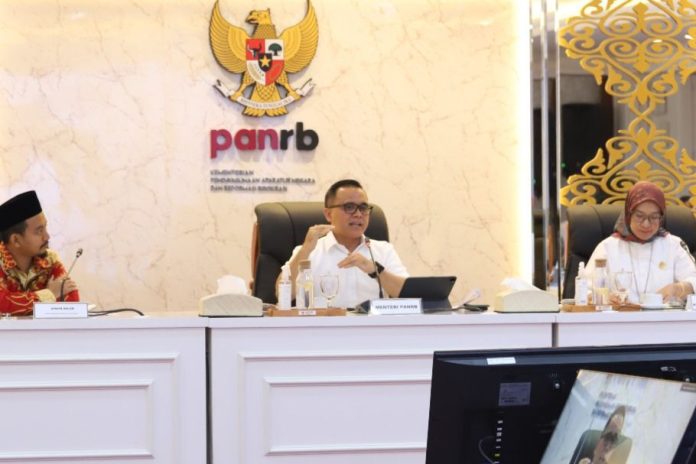JAKARTA – The Ministry of Administrative and Bureaucratic Reform intensively promotes the national bureaucratic reform agenda by accelerating the digital transformation of government through various initiatives and policies.
In this regard, Minister of Administrative and Bureaucratic Reform Abdullah Azwar Anas met with a number of digital practitioners and experts to seek input.
“Digital transformation of public services is carried out through the Electronic-Based Government System (EBGS) scheme. The government is preparing govtech to integrate all services gradually as directed by President Jokowi. Today, we got a lot of insights from digital experts on the strategy, implementation, and communication of the digital transformation,” said Anas on Monday (6/11).
Attending the meeting were digital practitioner and “Tech for Good” activist Ainun Najib, Sevenpreneu CEO Raymond Chin, Hukumonline COO Jan Ramos Pandia, Elitery President Director Kresna Adiprawira, Antler Indonesia Partner Agung Bezharie, Feedloop CEO Ahmad Rizqi Mediarso, and Tony Blair Institute Digital Government Manager Pandu Kartika Putra.
Also present were Expert Staff of the Indonesian Minister of Health for Health Technology Setiaji, Expert Staff of the Minister of Health Izak Jenie, Project Director – Digital Transformation of Government Procurement Telkom Indonesia Rahmat Danu Andika, President Director of Peruri Dwina Septiani Wijaya, and Director of Operations and Technology of PMO Prakerja Hengki Sihombing.
Anas said that digitalisation is the “toll road” for public services. Digitalisation will accelerate and integrate various public services, so that the impact is more optimal to the community, starting from pursuing poverty alleviation targets, increasing investment, and solving various community problems.
He also said that the direction of Indonesia’s digital transformation is on the right track as well as good practices in countries with leading e-government, such as the UK, Estonia, and Australia.
“Input from fellow practitioners and digital experts has further detailed the direction of accelerating the digital transformation of public services,” he said.
Anas also emphasized the importance of digital transformation to make public services faster and easier.
“This is not easy. A number of countries also have similar experiences to Indonesia. In the UK, for example, thousands of applications were integrated into only 75 applications. There were also 2,000 web-based services in the UK which were then integrated into one public service portal. This means that in the UK it was initially the same as Indonesia, with a different scale. But then there is integration that makes it easier for the people,” he explained.
In Indonesia alone, there are tens of thousands of applications within the government. Therefore, President Jokowi directed that everything be gradually integrated so as not to trouble the people.
“If you want to access permit A now, you have to go to application A. But if you want to take care of document B, you have to go to application B. This will be integrated,” said the former head of the National Public Procurement Agency (LKPP).
Currently, Anas continued, a Presidential Regulation (Perpres) on Digital Transformation and National Digital Service Integration is being prepared, which will double the pace of transformation in the country.
One digital practitioner, Ainun Najib, said he was happy with the attention of all parties who realized the importance of digital transformation of public services in the country.
Ainun also assessed that the coordination carried out by the Ministry of Administrative and Bureaucratic Reform by involving various parties to realize EBGS in Indonesia has been very good.
“I am very happy today, and optimistic that in the future we can jointly realize the digital transformation of public services,” said Ainun, who is known for various digital innovations to help the community.
Ainun explained that EBGS techniques that have been carried out in many developed countries have the same essence, namely one governance and one standardization of interoperability between systems.
In the preparation of the Perpres on Digital Transformation, it is expected that there are three principles of e-govt, namely one data, one system, and one place.
“Every ministry/agency must speak the same language, using one system,” he said.




